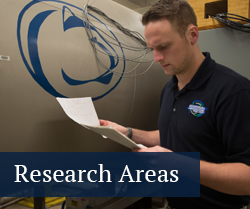
Traditional Master of Science with Thesis
The traditional M.S. degree is based on a combination of graduate course work and research which is documented and culminates in a Master of Science thesis which the students writes and orally defends. Both the course selection and research are directed by an adviser. At least two other faculty members, upon the adviser's suggestion, will be appointed to form a thesis committee.
Course Requirements
The graduate course credits for the M.S. degree must meet the following criteria:
- Total number of credits required for M.S. degree = 30
- Minimum number of credits taken at University Park Campus = 20
- Number of course credits required = 24
- Number of core course credits required = 18
- Number of Research credits (ACS 600) required = 6
- Maximum number of Individual Study (ACS 596) credits = 6
The six non-core course credits may be selected from the “Required and Approved” list of courses issued by the Acoustics Program Office. Of the 24 course credits required, at least 15 credits must be earned from 500 level courses. Of these 15 credits there must be 1 credit of Colloquium (ACS 590) and not more than 6 credits of Individual Study (ACS 596). Students may take more than 1 credit of Colloquium (ACS 590) and more than 6 credits of Individual Study (ACS 596) or Research (ACS 600), but such credits cannot be applied to the total number of course credits required for the M.S. degree.
M.S. Thesis Requirements
By writing an acceptable M.S. thesis, a student demonstrates that he or she is capable of completing a well-defined, directed study of a limited problem and is capable of writing a relatively brief, coherent report summarizing the major objectives and results of the study. Although in most cases the thesis work will be publishable, this is not a requirement for the degree.
Upon completion of the thesis research, and after editorial review by the adviser, the student will supply the members of his or her committee with a clean draft copy of the thesis at least 2 weeks prior to the thesis defense. The student must then defend the thesis before the committee. Under very special circumstances, exceptions to this procedure may be granted by the program chair.
The thesis defense is open to the public and students are urged to attend the defense sessions of their colleagues to gain an appreciation of the proceedings. The Program Office must be notified at least 2 weeks prior to the scheduled thesis defense so that announcements of the defense can be circulated to faculty and students. A thesis presentation should emulate the presentation of a paper at a technical session of a professional society meeting. It should be presented in a definite time interval. The talk should have been rehearsed to verify the time required and to refine the presentation. The student is expected to answer questions from the committee without undue reliance upon the adviser. The student should address the weak points of his/her research as well as the major contributions.
The thesis must be written according to the guidelines discussed in the Thesis Guide available from the J. Jeffrey and Ann Marie Fox Graduate School. Historically, the signatory page is the page most often rejected by the Fox Graduate School because of some error in format or in the citing of the title of members of the committee. The student is urged to pay particular attention to this page and to consult the Acoustics Program Office to eliminate unnecessary problems. After the thesis has been approved by at least two-thirds of the members of the committee, the final amended thesis draft will be reviewed again by the thesis adviser to ensure that it conforms to the recommended and agreed upon changes requested by the committee. An electronic copy of the thesis is required by the Fox Graduate School and one bound copy is to be presented to the Acoustics Program Office (Black cover with gold lettering). An additional bound copy may be required by the thesis adviser and/or committee members. The costs of thesis preparation, copying, and binding are the responsibilities of the student. The student should consult with the Acoustics Program Office before final preparation of the bound and unbound copies of the report
Time to Completion
The entire M.S. degree program, for a resident student on a half-time assistantship, should typically require no more than 2.5 years to complete. Because of this short time duration, it is paramount that a student begin work on the thesis research as soon as possible, and certainly before the end of the first year of study. In the first semester of residence, it is the responsibility of each student to determine what research is being conducted in the program as well as which of the faculty members might be willing to serve as a thesis adviser. One way of learning what work is being done in the program is for the students to attend some of the various seminars conducted each semester.



